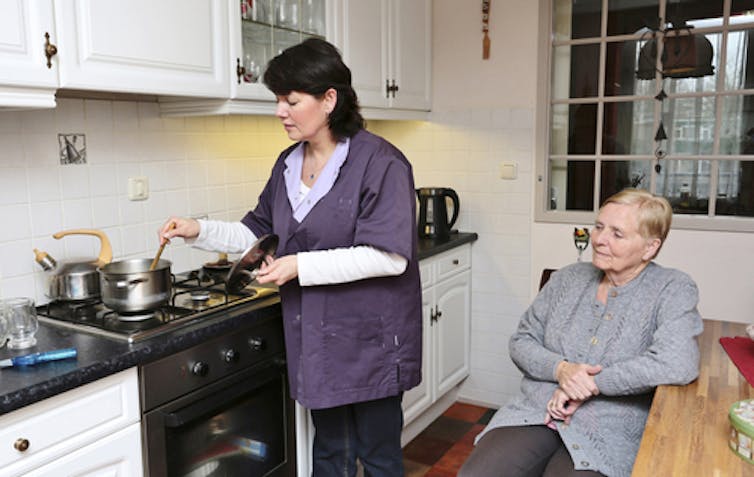Most caregivers of people with dementia are family members, and they need help

By Expert Contributors: Alan Stevens, Texas A&M University; Carole White, The University of Texas at Austin; Marcia G. Ory, Texas A&M University, and Sandhya Sanghi, Texas A&M University
Family care of an older adult has emerged as an essential element of the U.S. health care system, with 83 percent of long-term care provided to older adults coming from family members or other unpaid helpers. As the population of older adults grows, so too does the expectation of family care for persons living with dementia.
We have engaged in decades of research, documenting the impact of dementia caregiving on the health and well-being of the caregiver. We have also conducted research to create evidence-based interventions that can be defined as structured programs with positive results that have been scientifically proved through clinical trials.
We have learned much from family caregivers who report that the amount and type of care expected of them is growing, and have concluded that caregiving demands should be matched by community-based support systems. We have advocated for the adoption of one evidence-based intervention, called REACH II (Resources for Enhancing Alzheimer’s Caregiver Health II), which is designed to help caregivers manage daily care into health care and community-based organizations.
Challenges to family caregiving

Family caregivers experience multiple challenges daily when caring for a person with dementia, whose care needs steadily increase as cognitive abilities decline. Care burdens can have high physical, emotional and financial costs. An overview, or a meta-analysis, of 84 studies found that caregivers experienced more depression and stress than non-caregivers.
More recently, AARP reported that more than one in three, or 36 percent to be specific, of family caregivers who were not currently in the labor force said they retired early or quit their jobs because of family caregiving concerns.
Despite the critical role that family caregivers play, support programs based on evidence based interventions are not widely available. The National Academies report Families Caring for an Aging America concluded that “few of the nation’s millions of family caregivers of older adults have access to evidence-based interventions.” Moreover, caregivers are often marginalized or ignored by formal health care providers of the person with dementia.
Supporting family caregivers
Interventions that combine education about dementia and advice about specific “do’s and don’t’s” of dementia care with guided training and practice appear to be of greatest value to family caregivers. This approach of providing multiple types of support and training allows the intervention to address the vast spectrum of challenges faced by caregivers and allows support and training activities to be tailored to the unique needs of each family.
While scientific research has demonstrated the value of providing education, skills training and support to family caregivers, we have found in our research that health care and social service providers do not routinely provide support programs based on evidence-based interventions. Thus, for the vast majority of family caregivers, caregiving support services remain extremely fragmented if not elusive. Family caregivers are often left alone to provide care that can be complicated and exhausting 24/7.
From our experience, the lack of caregiving support services that are evidence-based is not solely driven by neglect from health care and social support service providers. Rather, existing evidence-based interventions require dedicated personnel who must be trained to deliver the intervention, yet the delivery of the intervention are not covered by Medicare and other third-party payers.
Additionally, family caregivers are often either unaware of existing services, or they are unable to participate due to emotional stresses, time commitments or scheduling concerns. Finally, there are systemic barriers associated with the failure to translate research into practice, resulting in limited program implementation by community-based agencies that provide care to older adults and assistance to dementia caregivers.
Without care for the caregiver, the system crumbles

We believe that forging strong partnerships between health care systems that frequently see patients with dementia and the community-based organizations that provide ongoing supportive services that help caregivers develop skills to deal with negative behaviors associated with memory loss (e.g., agitation or wandering) is necessary to bridge the gap in caregiving services.
Leveraging technology, such as offering online information and support to increase educational opportunities and perhaps even automating some aspects of intervention delivery, will help ensure access to services to the widest possible audience. Working directly with employers to provide proven services to the workforce could mitigate the negative economic impact of premature employment reduction.
While changes in the health care system and workplace are important, we believe that all sectors of our society need to more formally recognize family caregiver services. Such an approach can change attitudes, reduce stigma and foster caring and supportive behavior toward those living with dementia. One example is the Dementia Friendly America initiative, a national effort to support and serve those who are living with dementia, their caregivers and families.
Communities are also taking action by leveraging tailored resources in business, community-based services and supports, faith communities, health care communities, legal and financial services, local government and residential settings.
While improvements are needed in all community sectors recognized by the Dementia Friendly America model, this is especially so in the health care sector. Family caregivers are the source of greatest impact on the health of a person living with dementia, yet are often excluded in conversations with the person’s health care providers. Health care providers should be encouraged to document the role of the family caregiver in the a patient’s electronic health record.
Also, health care providers should make every attempt to involve the family caregiver in all health care interactions, especially in discharge planning after a hospital stay. As a sector, health care systems can also facilitate a dementia friendly approach by directing families to community-based social support services to address common challenges such as getting medications and transportation to health care appointments.
There is a role for higher education as well. Colleges and universities could help prepare a dementia-friendly health care work force to meet the needs of the growing numbers of persons with dementia, estimated to nearly triple by midcentury with an American being diagnosed with dementia every 33 seconds. Attention to dementia-friendly practices such as differentiating dementia from normal aging, early investigation of dementia symptoms by a health care professional and basic training in how to communicate with a person with dementia should be encouraged across the social and health disciplines.
Our care system depends heavily on family caregivers. If their needs are not recognized and addressed, family caregivers risk burnout from the prolonged distress and physical demands of caregiving, and the nation will bear the costs.
Alan Stevens, Professor of Medicine; Director, Center for Applied Health Research, Texas A&M University; Carole White, Professor and Nancy Smith Hurd Chair in Geriatric Nursing and Aging Studies, The University of Texas at Austin; Marcia G. Ory, Regents and Distinguished Professor, Associate Vice President for Strategic Partnerships and Initiatives, Texas A&M University, and Sandhya Sanghi, Assistant Investigator, Texas A&M University
This article is republished from The Conversation under a Creative Commons license. Read the original article.

